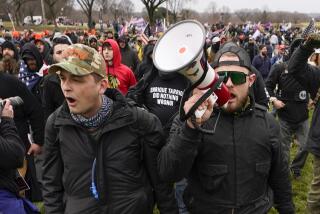Prosecutor Suggests North Deceived FBI
- Share via
WASHINGTON — A federal prosecutor, seeking to convince jurors that Oliver L. North’s credibility is highly suspect, attempted to show Wednesday that North followed a pattern of deception in dealing with many government officials, not just members of Congress.
Although North is standing trial on charges of making false statements to Congress and obstructing congressional inquiries, prosecutor John W. Keker produced documents suggesting that the retired Marine officer had also been “misleading or deceiving” FBI agents and fellow White House officials about his secret work for Nicaragua’s rebels.
In responding to Keker, whose brusque cross-examination often has angered him, a slightly edgy but mostly even-tempered North said, “I don’t remember,” to some of the questions, contended that other actions were honest mistakes and that still other of his statements were technically or literally true, even though potentially misleading.
North testified also that he thought he was protecting then-President Ronald Reagan when he altered six “problem memos” before investigators from the Justice Department could look at them. Former National Security Adviser Robert C. McFarlane had told him to destroy the documents, he said.
“I had been led to believe that everything I was doing was done at the direction of the President,” he declared.
“You had been told by the President of the United States to destroy documents? Explain how you had come to that conclusion?” Keker asked him.
“Because everything I had done that was described in the documents on this list I had been told was at the direction of the President,” North replied.
Contradicts McFarlane
North’s testimony contradicts McFarlane, who said it was North who proposed making changes to the documents in the late summer of 1985.
When Keker asked North what he had told two FBI agents in 1986 about associate Richard V. Secord’s links to a past federal investigation, North replied: “I don’t remember my responses.” But he acknowledged that he may have told the agents that “Secord does not work for me.”
At the time, Secord, a retired Air Force general and former Pentagon official, was North’s chief assistant in resupplying the Nicaraguan Contras with weapons purchased abroad.
North said that he may also have told the FBI, as a report filed by agents said, that “my staff was not funding the Contras and was not directly involved in arming them.”
Those statements were “literally true” but may have given a false impression of his considerable Contra aid activities, North said.
“I did not explain the full panoply of our operations to the FBI,” North told jurors.
Similarly, Keker showed North a memo from Fred F. Fielding, then White House counsel, in October, 1985, dealing with the activities of Carl R. (Spitz) Channell, a conservative activist who helped raise private funds for the Contras, and Barbara Newington, a major contributor.
In referring to letters that Reagan planned to send Channell and Newington, Fielding said in his memo: “Oliver North has advised my office that the recipients are not involved in raising private funds for the Contras.”
“It is true that Barbara Newington was not raising funds,” North told Keker. He added that, “as to Mr. Channell, the letter doesn’t mention NEPL,” the tax-exempt National Endowment for the Preservation of Liberty, an organization Channell has admitted using illegally to raise donations for the rebel forces.
In addition, Keker read jurors a 1986 memo that North had written to his boss, then-National Security Adviser John M. Poindexter, saying that an airfield North had had built in Costa Rica “has been a vital element” in resupplying the Contras since July, 1985.
After North said that “I don’t remember” the memo, Keker cited evidence presented at the trial that the airfield had not become usable until early 1986 and that the only plane that ever landed there “got stuck in the mud and had to be towed out.”
“Were you exaggerating your role, trying to show your boss you were doing more than you really were?” Keker demanded.
“I tried to report as accurately as I could, Mr. Keker,” North replied. “If I was off by several months, it was no effort to mislead him.”
North smiled proudly, however, when asked by U.S. District Judge Gerhard A. Gesell about one deception. Gesell wondered what North had told an unreliable Iranian middleman, Manucher Ghorbanifar, when he was discussing arms sales to Iran--another operation in which North participated while at the National Security Council.
“I told him any number of things, your honor, some of which were true,” North said. “I dissembled with him a lot.”
More to Read
Sign up for Essential California
The most important California stories and recommendations in your inbox every morning.
You may occasionally receive promotional content from the Los Angeles Times.













